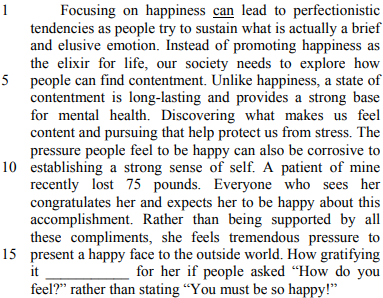Questões Militares Comentadas por alunos sobre verbos modais | modal verbs em inglês
Foram encontradas 84 questões
Resolva questões gratuitamente!
Junte-se a mais de 4 milhões de concurseiros!
Read the text and answer the question.
The pursuit of happiness can end in pain
Maggie Mulqueen, psychologist

Adapted from https://www.nbcnews.com/think/opinion/suicide-studentathletes-happiness-contentment-rcna27992
Language-centered methods are those that seek to provide opportunities for learners to practice preselected linguistic structures through form-focused exercises in class. The assumption is that language practice will ultimately lead to a mastery of the target language and that learners can draw from this formal repertoire whenever they wish to communicate in the target language outside the class. According to this belief, language development is largely intentional rather than incidental; and language learning seen as a linear, additive process.
Learner-centered methods are those that are principally concerned with language use and learner needs. These methods seek to provide opportunities for learners to practice preselected, presequenced grammatical structures as well as communicative functions (i.e., speech acts such as apologizing, requesting, etc.) through meaning-focused activities. Proponents of learner-centered methods believe in accumulated entities, represented by structures plus notions and functions.
Learning-centered methods are those that are principally concerned with learning processes. These methods seek to provide opportunities for learners to participate in open-ended meaningful interaction through communicative activities or problem-solving tasks in class. The assumption is that a preoccupation with meaning-making will most likely lead to grammatical as well as communicative mastery of the language and that learners can learn through the process of communication. In this approach, unlike the other two, language development is a nonlinear process and considered more incidental than intentional. Proponents of learningcentered methods believe that language is best learned when the learner’s attention is focused on understanding, saying and doing something with language, and not when their attention is focused explicitly on linguistic features.
(Kumaravadivelu, B. Beyond Methods: Macrostrategies for language learning. Haven and London: Yale University Press. 2003. Adaptado)

1 – Impossibility
2 – Possibility
3 – Prohibition
4 – Advice
( ) Mark studied hard for his exams, but he got poor marks; he can’t be very clever.
( ) You should work less! You look too tired!
( ) She may be in the garden.
( ) You mustn’t enter here.